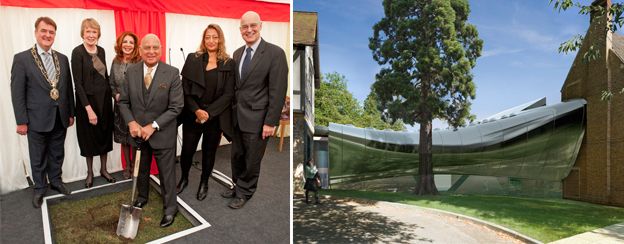Photo (from left to right): Councillor Alan Armitage, Lord Mayor of Oxford; Professor Margaret MacMillan, Warden of St Antony's College; Mrs Nada Kirdar; Mr Nemir Kirdar, Investcorp Executive Chairman and CEO; Zaha Hadid, Architect; Professor Andrew Hamilton, Vice-Chancellor of the University of Oxford.
Render: Softbridge Building, St Antony's College
![]()
January 31, 2013 -- Zaha Hadid visited Oxford to celebrate the start of construction works at St Antony's College.
Dubbed the 'Softbridge', the new building will be known as the The Investcorp Building on completion in the summer of 2014.
The building has been made possible through a generous donation of £11 million funded by the international alternative asset management firm, Investcorp. The guest of honour at the ground-breaking ceremony was Investcorp's Executive Chairman and CEO, Mr Nemir Kirdar.
The three-storey Softbridge building will form a suspended 'bridge' between numbers 66 and 68 Woodstock Road and provides 1,200 square metres of floor-space. Its new lecture theatre, replacing the cramped rooms where public seminars are currently held, offers 125 seats and disabled access. The building will also house a new library and purpose-built archive facility, doubling the amount of space currently available.
Mr Nemir Kirdar said: 'Investcorp was founded to create a bridge between investors in the Gulf States and investment opportunities in Europe and the US. I am delighted that Investcorp's funding now makes possible this magnificent new centre - a building dedicated to deeper cross-cultural understanding. Its bridge design beautifully encapsulates the links that we hope the Centre will forge between the Middle East and the West.'
Dame Zaha Hadid said: 'I am delighted to be building in Oxford. The work of the Middle East Centre at St Antony's College contributes to the global discourse; essential in our understanding of the region. The new building enables the College to further develop its renowned archive, library and seminar programmes as a vital forum for the exchange of ideas.'
'The design defines a series of academic and research facilities using a formal language of paths and connections that allows the existing buildings to be read as separate elements, maintaining their current detached character. The floating nature of the 'bridge' is emphasised via its stainless steel cladding which has a light and ephemeral appearance to echo its context.' explains Hadid.
Founded in 1957, the Middle East Centre at St Antony's College serves as the University of Oxford's facility for research and teaching on the Arab world, Iran, Israel and Turkey from the 19th century to the present day. Since 1978, the Centre has been housed at 68 Woodstock Road (the former rectory of the Church of St Philip and St James, built in 1887). The Centre comprises a major research library, based in 68 Woodstock Road, and an internationally recognised archive of private papers and historic photographs of the Middle East, situated in the basement of 66 Woodstock Road.
On the completion of the Softbridge Building, the Middle East Centre Library and the archive will move into purpose-built facilities, providing state-of-the-art resources to conserve and manage the collections. This will make space available in the existing buildings for 14 academic offices and a seminar room. The need for more teaching space has grown more acute as student numbers have expanded dramatically in recent years, with over 30 Masters students and more than 40 doctoral candidates now studying at the centre.
The Vice-Chancellor of the University of Oxford, Professor Andrew Hamilton, said: 'We are hugely grateful to Investcorp for this most generous donation. It enables a building designed by one of the world's most exciting architects to be created in Oxford.
We hope that members of the public, as well as University staff and students, will enjoy the new building's stunning, state-of-the-art lecture theatre and the new dedicated spaces for displays of Middle Eastern art which will also be open to the public.'
Dr Eugene Rogan, a Fellow of the Middle East Centre, has worked with Zaha Hadid Architects to bring this project to fruition. He said: 'Zaha Hadid was the ideal choice for this project as she is one of Britain's greatest architects with her roots firmly in the Middle East. That nicely paralleled our vision of Oxford's Middle East Centre as a British centre of excellence with deep roots in the region. With this new building, the Middle East Centre enters a new era as one of the world's finest research facilities on this area of crucial public interest.'


